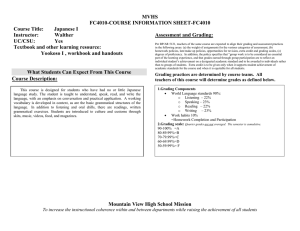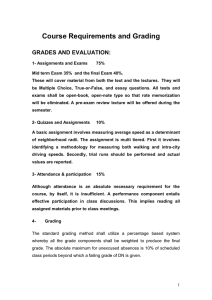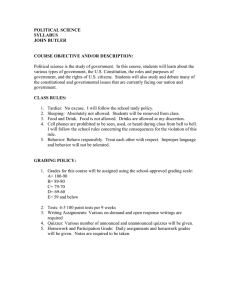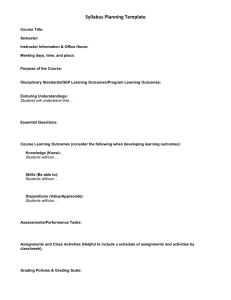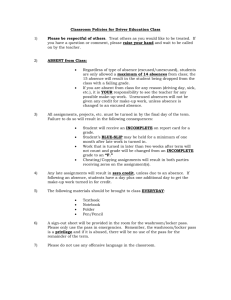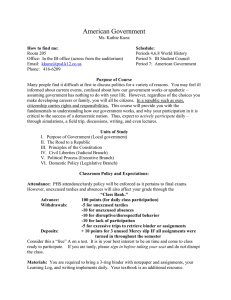MVHS FA4014-COURSE INFORMATION SHEET-FA4014 Course Title: Japanese AP
advertisement
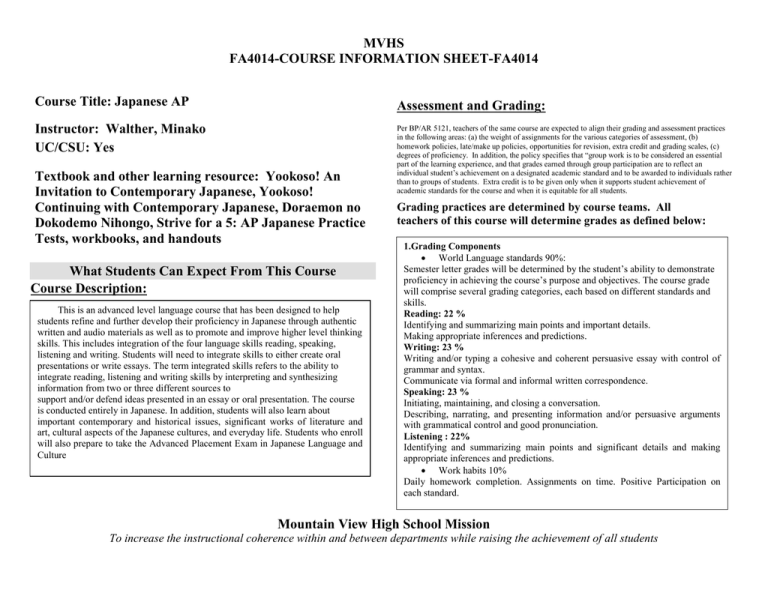
MVHS FA4014-COURSE INFORMATION SHEET-FA4014 Course Title: Japanese AP Assessment and Grading: Instructor: Walther, Minako UC/CSU: Yes Textbook and other learning resource: Yookoso! An Invitation to Contemporary Japanese, Yookoso! Continuing with Contemporary Japanese, Doraemon no Dokodemo Nihongo, Strive for a 5: AP Japanese Practice Tests, workbooks, and handouts What Students Can Expect From This Course Course Description: This is an advanced level language course that has been designed to help students refine and further develop their proficiency in Japanese through authentic written and audio materials as well as to promote and improve higher level thinking skills. This includes integration of the four language skills reading, speaking, listening and writing. Students will need to integrate skills to either create oral presentations or write essays. The term integrated skills refers to the ability to integrate reading, listening and writing skills by interpreting and synthesizing information from two or three different sources to support and/or defend ideas presented in an essay or oral presentation. The course is conducted entirely in Japanese. In addition, students will also learn about important contemporary and historical issues, significant works of literature and art, cultural aspects of the Japanese cultures, and everyday life. Students who enroll will also prepare to take the Advanced Placement Exam in Japanese Language and Culture Per BP/AR 5121, teachers of the same course are expected to align their grading and assessment practices in the following areas: (a) the weight of assignments for the various categories of assessment, (b) homework policies, late/make up policies, opportunities for revision, extra credit and grading scales, (c) degrees of proficiency. In addition, the policy specifies that “group work is to be considered an essential part of the learning experience, and that grades earned through group participation are to reflect an individual student’s achievement on a designated academic standard and to be awarded to individuals rather than to groups of students. Extra credit is to be given only when it supports student achievement of academic standards for the course and when it is equitable for all students. Grading practices are determined by course teams. All teachers of this course will determine grades as defined below: 1.Grading Components World Language standards 90%: Semester letter grades will be determined by the student’s ability to demonstrate proficiency in achieving the course’s purpose and objectives. The course grade will comprise several grading categories, each based on different standards and skills. Reading: 22 % Identifying and summarizing main points and important details. Making appropriate inferences and predictions. Writing: 23 % Writing and/or typing a cohesive and coherent persuasive essay with control of grammar and syntax. Communicate via formal and informal written correspondence. Speaking: 23 % Initiating, maintaining, and closing a conversation. Describing, narrating, and presenting information and/or persuasive arguments with grammatical control and good pronunciation. Listening : 22% Identifying and summarizing main points and significant details and making appropriate inferences and predictions. Work habits 10% Daily homework completion. Assignments on time. Positive Participation on each standard. Mountain View High School Mission To increase the instructional coherence within and between departments while raising the achievement of all students Attendance: 2.Grading Scale: 90-100% =A 80-89.99%=B 70-79.99%=C 60-69.99%=D 50-59.99%= F ABSENCES: An “unexcused absence” is an absence in excess of a 30-minute period occurring in a given class. Students may not exceed 14 unexcused absences across their entire schedule. A full day, unexcused absence counts as 5, 6 or 7 absences depending on how many classes a student carries toward the total of 14. On the 15th unexcused absence, students may be referred to an alternative educational program/site pursuant to the District’s involuntary transfer policy (AR/OP 5113). 3.Homework Policy Homework will be graded for completion and accuracy. Students who don’t have homework completed may come in at lunch to do the assignment with help from the teacher. Homework must be made up within two days of the due date. 4.Late Work, missing work and opportunities for revision Students are expected to turn in work on the due date. The work habits grade will be affected by late work. Late work or missing work will not be accepted later than one calendar week after the due date. Make-up work can be done with your teacher at lunch or after school. Make-up work must be done within one calendar week upon students’ return. It is the student’s responsibility to make-up all missed work. Because making and correcting mistakes is also part of the learning process, students are encouraged to take advantage of the teacher’s revision opportunities. 5.Group work Refer to BP/AR 5121 as stated above. 6. Extra credit No Extra Credit is offered. 7.How proficiency is determined/how student work is assessed Proficiency will be determined by the student’s ability to achieve mastery of the standards. 8.Grade Book Update Policy The Student Information System will be updated regularly. Please make sure to check your grade often. What Is Expected Of The Student TARDIES: Students may not exceed 19 unexcused tardies across their entire schedule. An unexcused tardy is an absence from class from when the bell rings until up to 30 minutes of a class period. At the 15th unexcused tardy, there will be a mandatory parent conference with the student’s Assistant Principal. This conference will be scheduled to occur the morning after the family is contacted by the school. At the student/parent conference, consequences for continued tardiness are discussed and the student is assigned to Saturday School. An attendance contract will also be signed at this meeting. Failure to attend Saturday School may result in a transfer to an alternative educational program/site. Classroom Rules: Refer to classroom rules and expectations handout Students can expect weekly quizzes. Respect teacher and classmates. No electric devices at all: cell phone, ipod, ipad, etc No gum, food or drinks (water okay) No curse words or insults will be tolerated in any language. Cheating Policy: The Board expects that students will not cheat, lie, plagiarize or commit other acts of academic dishonesty. Examples of cheating include: anyone who copies another’s work or turns in someone else’s ideas as his or her own, collaboration with another student or students could be considered cheating if students are expected to complete an assignment independently, copying homework, allowing someone else to copy your work, plagiarism, copying or allowing others to copy from another’s exam, improperly obtaining and/or using tests, questions, or answer keys, using unauthorized notes/materials or electronic equipment (calculators, cell phones, etc.), with greater access to the Internet and electronic sources, students need to be very clear about their responsibilities in using these tools with integrity. Check with your teachers if you are unsure or unclear about his/her expectations regarding the use of the Internet. Digital Device Use Expectations: Devices can only be used in class at the teacher’s discretion and should use them in line with the MVLA DIGITAL DEVICE agreement and Behavior Policies. If distraction becomes an issue, the teacher will manage the situation as they would with any other distraction and in line with the relevant policies. While working in a digital and collaborative environment, students should always conduct themselves as good digital citizens by adhering to the following: 1. Respect yourself 4. Protect others Daily Assignments: Expect homework every night. You should spend approximately a half-hour of concentrated study doing written assignments as well as reviewing, studying, doing listening exercises and oral practice. Assignments are posted on the teacher website and/or written everyday on the classroom board. 2. Protect yourself 3. Respect others. 5. Respect intellectual property 6. Protect intellectual property Help and Contact Information Phone: (650) 691-2420 Email: minako.walther@mvla.net Mountain View High School Mission To increase the instructional coherence within and between departments while raising the achievement of all students Mountain View High School Mission To increase the instructional coherence within and between departments while raising the achievement of all students
